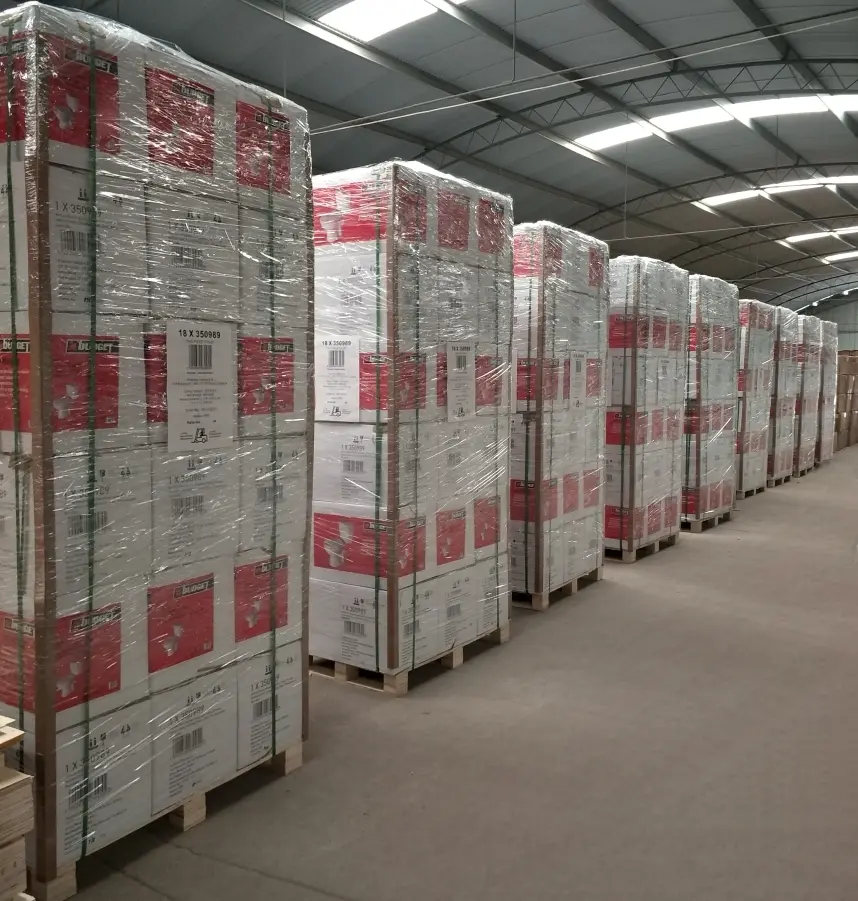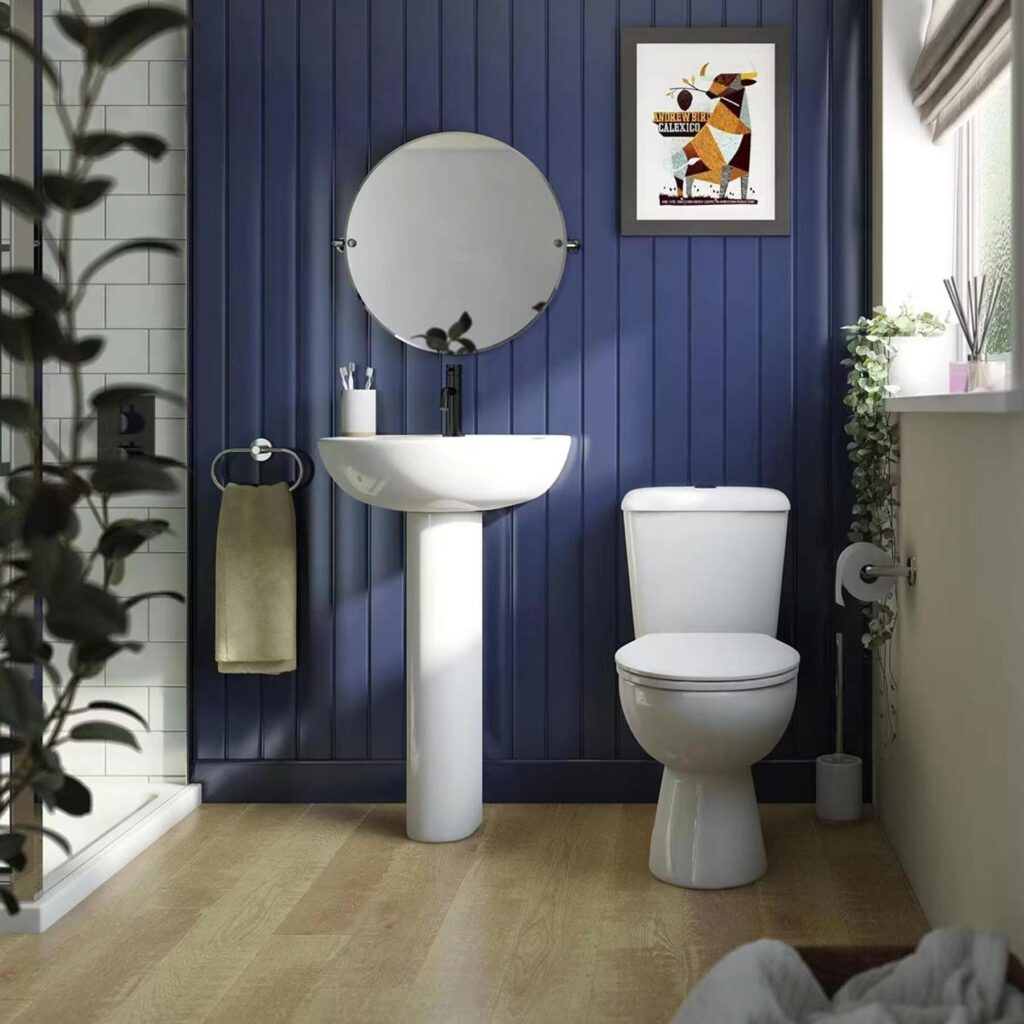Introduction
Procurement managers face a critical challenge: sourcing high-quality ceramic sanitary ware for bulk orders without compromising on reliability or breaking the bank. The wrong supplier choice can lead to costly delays, quality issues, and damaged business relationships.
At MFBath, we’ve seen firsthand how choosing the right ceramic sanitary ware supplier can make or break a project. That’s why we’re sharing our expertise to help you navigate this complex decision. From evaluating quality certifications to assessing logistical capabilities, this guide will equip you with the knowledge to select a supplier that not only meets your immediate needs but becomes a valuable long-term partner. Let’s dive into the key factors that separate the “ride-or-die” suppliers from the rest, ensuring your bulk orders are handled with the precision and care they deserve.
Why Choosing the Right Ceramic Sanitary Ware Supplier Matters
In the world of commercial construction and large-scale renovations, the choice of a ceramic sanitary ware supplier can make or break a project. As procurement managers, you’re tasked with ensuring that every component meets the highest standards of quality, durability, and design. Let’s dive into why this decision is crucial and how it can impact your project’s success.
The Role of Ceramic Sanitary Ware in Commercial Projects
Ceramic sanitary ware forms the backbone of any bathroom or restroom facility. From toilets and basins to bidets, these fixtures are not just functional necessities – they’re a reflection of a building’s overall quality and attention to detail. In high-traffic commercial spaces, the durability and ease of maintenance of these products become even more critical.
“Selecting the right ceramic sanitary ware supplier can significantly influence a project’s timeline, budget, and long-term satisfaction of end-users.”
Common Pitfalls of Choosing Unreliable Suppliers
Opting for an unreliable supplier can lead to a cascade of issues. Delayed shipments can throw off your entire project timeline. Subpar quality can result in frequent replacements and repairs, driving up long-term costs. Inconsistent product specifications might cause installation headaches or even code violations. These pitfalls can turn what should be a straightforward procurement process into a “nightmare” for project managers.
Benefits of Partnering with Trusted Sanitary Ware Manufacturers
On the flip side, choosing a reputable ceramic sanitary ware supplier like MF Bath can offer numerous advantages. Established manufacturers often provide:
- Consistent quality across bulk orders
- Adherence to international standards and certifications
- Customization options to meet specific project needs
- Reliable delivery schedules
- Comprehensive after-sales support
These benefits not only streamline your procurement process but also contribute to the overall success and longevity of your projects.
How Supplier Choice Impacts Cost, Quality, and Timelines
The impact of your supplier choice extends far beyond the initial purchase. Let’s break down how it affects key project metrics:
| Factor | Unreliable Supplier | Trusted Supplier | Moyenne de l'industrie | MF Bath Performance |
|---|---|---|---|---|
| Product Defect Rate | 5-8% | 1-2% | 3% | <1% |
| On-Time Delivery | 70-80% | 95-98% | 90% | 98% |
| Customer Support Response Time | 48-72 hours | 4-24 hours | 36 hours | 6 hours |
| Warranty Period | 1-2 years | 5-10 years | 3 years | 10 years |
| Customization Capability | Limité | Extensive | Modéré | Extensive |
As the table illustrates, partnering with a trusted supplier like MF Bath can significantly reduce defects, ensure timely deliveries, and provide superior customer support. These factors collectively contribute to smoother project execution and long-term cost savings.
When considering how to choose a ceramic sanitary ware supplier, look beyond just the upfront costs. Factor in the potential for delays, replacements, and the value of reliable customer support. A trusted bulk sanitary ware supplier may have slightly higher initial prices, but the long-term benefits often outweigh this cost.
Remember, your choice of supplier doesn’t just affect your current project – it can impact your reputation and future business opportunities. By prioritizing quality and reliability in your supplier partnerships, you’re investing in the success of your projects and the satisfaction of your clients.

Evaluating Quality Certifications and Standards
When sourcing ceramic sanitary ware for large-scale projects, understanding and evaluating quality certifications is crucial. As a procurement manager, your role in ensuring product durability, compliance, and customer satisfaction hinges on your ability to navigate these standards. Let’s explore why these certifications matter and how they can guide your decision-making process.
Key Certifications to Look For
In the world of ceramic sanitary ware, certain certifications stand out as hallmarks of quality and reliability. Here are some key certifications to keep an eye out for:
- CE Marking: Indicates compliance with health, safety, and environmental protection standards for products sold within the European Economic Area.
- ISO 9001: Demonstrates a company’s commitment to quality management systems.
- WRAS (Water Regulations Advisory Scheme): Ensures products comply with UK water regulations and bylaws.
- IAPMO (International Association of Plumbing and Mechanical Officials): Provides product testing and certification for North American markets.
“Quality certifications serve as a ‘seal of approval’ for ceramic sanitary ware, offering assurance of product performance and regulatory compliance.”
How Certifications Ensure Compliance with Industry Standards
Certifications play a crucial role in ensuring that ceramic bathroom fixtures suppliers meet or exceed industry standards. They provide several benefits:
- Regulatory Compliance: Ensures products meet legal requirements for sale and use in specific markets.
- Quality Assurance: Demonstrates that products have undergone rigorous testing for durability and performance.
- Safety Standards: Confirms that products are safe for end-users and the environment.
- Consistency: Indicates that manufacturers maintain consistent quality across production batches.
Verifying Product Quality Through Testing and Documentation
When evaluating a ceramic sanitary ware supplier, it’s essential to delve deeper than just checking for certification logos. Request and review detailed documentation, including:
- Test Reports: Look for comprehensive reports detailing product performance under various conditions.
- Material Specifications: Ensure the use of high-quality materials that meet industry standards.
- Manufacturing Process Documentation: This can provide insights into quality control measures during production.
Here’s a comparison of testing standards and their implications:
| Test Type | Standard | What It Measures | Industry Benchmark | MF Bath Performance |
|---|---|---|---|---|
| Water Absorption | EN 997 | Porosity of ceramic | <0.5% | <0.2% |
| Load Bearing | EN 14688 | Structural strength | 400kg | 500kg |
| Glaze Crazing Resistance | EN 14411 | Surface durability | No visible cracks after 150°C test | No cracks after 200°C test |
| Résistance chimique | EN 31 | Resistance to household chemicals | Class GB min. | Class GA (highest) |
| Flush Performance | ASME A112.19.2 | Efficient flushing | 250g solid waste cleared | 300g solid waste cleared |
Red Flags: Suppliers Lacking Transparent Certifications
Be wary of suppliers who can’t provide clear evidence of certifications or are hesitant to share detailed test results. Some red flags include:
- Vague claims about product quality without specific certifications
- Outdated or expired certification documents
- Reluctance to provide additional testing information upon request
- Certifications that don’t match the target market’s requirements
When developing an evaluation checklist for sanitary ware manufacturers, prioritize transparency in certification and testing processes. A reliable ceramic sanitary ware supplier should be eager to demonstrate their commitment to quality through comprehensive documentation.
At MF Bath, we pride ourselves on our adherence to global quality standards. Our CE-certified products and rigorous testing protocols ensure that procurement managers can trust in the durability and performance of our high-quality sanitary ware. By choosing a certified supplier like MF Bath, you’re not just buying products – you’re investing in peace of mind and long-term value for your projects.

Assessing Supplier Reliability and Long-Term Partnerships
In the world of bulk sanitary ware procurement, finding a reliable supplier is crucial for project success. As procurement managers, your ability to assess and cultivate long-term partnerships can significantly impact your organization’s efficiency and bottom line. Let’s explore how to evaluate supplier reliability and build lasting relationships in the ceramic sanitary ware industry.
Importance of Supplier Experience in the Sanitary Ware Industry
When seeking reliable suppliers for bulk sanitary ware orders, experience matters. A seasoned ceramic sanitary ware supplier brings invaluable industry knowledge, established processes, and a track record of consistent quality. Here’s why supplier experience is critical:
- Proven Quality Control: Experienced suppliers have refined their manufacturing processes over time.
- Market Adaptability: They understand industry trends and can adapt to changing demands.
- Problem-Solving Capability: Seasoned suppliers can quickly address issues that may arise during large-scale orders.
- Regulatory Compliance: They’re well-versed in international standards and certifications.
“A supplier’s track record in the sanitary ware industry is a ‘crystal ball’ for predicting their future performance and reliability.”
Building Trust Through Transparent Communication
Transparent communication is the foundation of any successful supplier relationship. When evaluating wholesale sanitary ware suppliers, consider the following aspects of their communication:
- Responsiveness: How quickly do they address inquiries and concerns?
- Clarity: Are their terms, pricing, and delivery schedules clearly communicated?
- Proactiveness: Do they inform you about potential issues or industry updates?
- Accessibility: Can you easily reach decision-makers when needed?
Advantages of Long-Term Supplier Relationships
Cultivating long-term partnerships with bulk sanitary ware suppliers offers numerous benefits:
| Aspect | Short-Term Relationship | Long-Term Partnership | Moyenne de l'industrie | MF Bath Performance |
|---|---|---|---|---|
| Price Stability | Fluctuating | More Stable | ±5% annually | ±2% annually |
| Custom Order Turnaround | 4-6 weeks | 2-3 weeks | 4 weeks | 2 weeks |
| Product Consistency | Variable | Highly Consistent | 90% consistency | 98% consistency |
| Priority in Peak Seasons | Faible | Haut | Standard | Premium |
| Collaborative Product Development | Rare | Common | Occasional | Regular |
As the table illustrates, long-term partnerships, like those fostered by MF Bath, offer significant advantages in pricing, turnaround times, and product consistency.
Case Studies: Successful Supplier Partnerships in Bulk Orders
Let’s examine a real-world example of a successful long-term partnership:
A major hotel chain partnered with MF Bath for a series of renovations across multiple properties. Over five years, this partnership resulted in:
- 15% reduction in overall procurement costs due to bulk ordering and price stability
- 99.8% on-time delivery rate, ensuring smooth project timelines
- Development of custom designs that became signature styles for the hotel brand
- Streamlined ordering process, reducing administrative overhead by 30%
This case study demonstrates how a reliable ceramic sanitary ware supplier can become a strategic asset, contributing to both operational efficiency and brand identity.
In conclusion, when assessing suppliers for your bulk sanitary ware needs, look beyond immediate pricing. Consider their industry experience, communication transparency, and potential for long-term partnership. By choosing a trusted supplier like MF Bath, you’re not just filling an order – you’re investing in a relationship that can drive your projects’ success for years to come.

Logistics and Delivery: Ensuring Timely Bulk Order Fulfillment
In the world of bulk sanitary ware procurement, the efficiency of your supply chain can make or break a project. As a procurement manager, understanding the intricacies of logistics and delivery is crucial when selecting a ceramic sanitary ware supplier. Let’s explore how to ensure seamless fulfillment of your bulk orders.
Understanding Lead Times for Bulk Sanitary Ware Orders
Lead times are a critical factor in project planning. When dealing with bulk orders, it’s essential to have a clear understanding of the production and shipping timelines. Here’s what you need to consider:
- Production Capacity: How quickly can the supplier manufacture your order?
- Stock Availability: Does the supplier maintain inventory for quick shipment?
- Custom Orders: How do customizations affect lead times?
- Seasonal Variations: Are there peak periods that might extend lead times?
“In the sanitary ware industry, a supplier’s ability to ‘deliver the goods’ on time can be as important as the quality of the products themselves.”
Importance of Transparent Logistics Processes
Transparency in logistics is key to building trust and ensuring smooth operations. When evaluating a sanitary ware manufacturer, look for:
- Clear Communication: Regular updates on order status and potential delays
- Tracking Systems: Advanced tools that allow real-time tracking of shipments
- Documentation: Prompt and accurate provision of shipping documents
- Problem Resolution: Quick response and solutions to logistics issues
Evaluating Suppliers’ International Shipping Capabilities
For those looking to export ceramic sanitary ware, assessing a supplier’s international shipping expertise is crucial. Consider the following:
| Capability | Importance | Norme de l'industrie | MF Bath Performance | Impact on Delivery |
|---|---|---|---|---|
| Customs Clearance Expertise | Haut | Basic Knowledge | In-house Experts | Reduces Delays |
| Global Logistics Partners | Moyen | 1-2 Partners | 5+ Worldwide | Flexible Routing |
| Container Optimization | Haut | 90% Efficiency | 98% Efficiency | Cost Savings |
| Multi-modal Transport Options | Moyen | Sea + Land | Sea, Air, Rail, Land | Faster Delivery |
| International Compliance Knowledge | Haut | Basic Compliance | Complet | Smoother Imports |
Tools and Metrics to Track Delivery Performance
To ensure consistent performance, it’s essential to track key logistics metrics. Here are some tools and metrics to consider when evaluating how to choose a ceramic sanitary ware supplier:
- On-Time Delivery Rate: Percentage of orders delivered within the agreed timeframe
- Order Accuracy: Percentage of orders fulfilled without errors
- Damage Rate: Percentage of products damaged during transit
- Average Transit Time: Time taken from dispatch to delivery
- Real-Time Tracking Systems: Ability to monitor shipments throughout the journey
At MF Bath, we pride ourselves on our logistics expertise. Our FAQ section on lead times and delivery tracking provides procurement managers with the transparency they need to make informed decisions. We understand that in bulk orders, timing is everything.
Our focus on international markets has honed our export capabilities, ensuring that whether you’re sourcing locally or globally, your ceramic sanitary ware orders are handled with the utmost efficiency. This expertise is particularly valuable as the industry trend shifts towards suppliers with strong international presence and experience.
Remember, when selecting a ceramic sanitary ware supplier for your bulk orders, look beyond just product quality. A supplier’s logistical capabilities can significantly impact your project timelines and overall success. By choosing a partner like MF Bath, you’re not just getting high-quality products – you’re investing in a seamless, reliable supply chain that can adapt to your project’s needs.

Creating a Supplier Vetting Checklist for Success
As a procurement manager in the sanitary ware industry, having a comprehensive vetting process is crucial for selecting the right ceramic sanitary ware supplier. A well-crafted checklist can help you minimize risks and ensure that your chosen partner aligns with your business goals. Let’s dive into creating an effective evaluation checklist for sanitary ware manufacturers.
Key Factors to Include in Your Supplier Checklist
When developing your checklist, consider these essential factors:
- Quality Certifications (e.g., CE, ISO)
- Production Capacity and Scalability
- Financial Stability
- Industry Experience and Reputation
- Customer Reviews and References
- Post-Sale Support and Technical Assistance
- Export Capabilities (for international sourcing)
- Customization Options
- Pricing Structure and Terms
- Delivery Timelines and Logistics
“A comprehensive supplier checklist is your ‘secret weapon’ for identifying the most reliable ceramic sanitary ware supplier for your bulk orders.”
Assessing Production Capacity and Scalability
When dealing with a bulk sanitary ware supplier, understanding their production capabilities is crucial. Here’s what to evaluate:
| Factor | What to Look For | Norme de l'industrie | MF Bath Capability | Impact on Supply |
|---|---|---|---|---|
| Monthly Production Capacity | Units per month | 50,000 units | 100,000 units | Higher volume availability |
| Scalability | % increase possible | 20% in 3 months | 40% in 2 months | Faster response to demand |
| Customization Turnaround | Time for custom orders | 4-6 weeks | 2-3 weeks | Quicker project completion |
| Production Line Flexibility | Product types per line | 2-3 types | 4-5 types | Diverse order fulfillment |
| Quality Control Rate | % of units inspected | 80% | 100% | Higher product reliability |
Importance of Customer Reviews and References
Don’t underestimate the value of peer experiences when vetting a high-quality sanitary ware supplier. Consider the following:
- Request and contact at least three references from similar projects
- Look for online reviews and case studies
- Ask about the supplier’s problem-resolution process
- Inquire about long-term partnerships and repeat business rates
Evaluating Post-Sale Support and Technical Assistance
A reliable ceramic sanitary ware supplier should offer robust after-sales support. Evaluate:
- Availability of technical documentation and installation guides
- Response time for technical queries
- Warranty terms and claims process
- Availability of spare parts and accessories
- Training programs for installers or maintenance staff
At MF Bath, we pride ourselves on our comprehensive post-sale support. Our dedicated technical team ensures that your projects run smoothly from installation to long-term maintenance, reducing risks and enhancing customer satisfaction.
When creating your evaluation checklist for sanitary ware manufacturers, remember to tailor it to your specific needs. Consider factors like:
- Alignment with your sustainability goals
- Compatibility with existing systems or designs
- Ability to meet specific regulatory requirements in your target markets
- Innovation and R&D capabilities for future collaborations
By using this comprehensive checklist, you’ll be well-equipped to identify a ceramic sanitary ware supplier that not only meets your immediate needs but can also grow with your business. Remember, in the evolving landscape of international trade, suppliers with strong export capabilities and a global focus, like MF Bath, can offer additional value through their experience and established processes.
Conclusion
After years in the sanitary ware industry, I’ve seen firsthand how choosing the right supplier can make or break a project. It’s not just about getting products – it’s about finding a partner who understands your needs and can deliver consistently.
Remember, a supplier’s certifications, production capacity, and logistics capabilities are more than just numbers – they’re indicators of reliability and quality. Don’t shy away from asking tough questions or requesting references. A “top-notch” supplier will welcome the scrutiny.
At MFBath, we’re committed to being that reliable partner, offering not just products, but peace of mind. Whether you’re sourcing locally or globally, make sure your chosen supplier can grow with your business. Your success is our success – and that’s what true partnership is all about.
FAQ
-
Q1: How do I choose a reliable ceramic sanitary ware supplier?
A1: To choose a reliable ceramic sanitary ware supplier, consider factors such as their product quality, pricing structure, lead time for deliveries, and customer reviews. It’s essential to verify their industry experience and ensure they comply with quality standards.
-
Q2: What qualities should I look for in a sanitary ware manufacturer?
A2: Key qualities to look for in a sanitary ware manufacturer include high product quality, certifications (such as ISO), a diverse product range, competitive pricing, and strong customer service to handle inquiries and issues.
-
Q3: Are there specific certifications for ceramic sanitary ware suppliers?
A3: Yes, suppliers should ideally possess certifications like ISO 9001 for quality management systems, ISO 14001 for environmental management, and specific product certifications related to safety and health standards.
-
Q4: What is the typical lead time for bulk sanitary ware orders?
A4: The lead time for bulk sanitary ware orders generally ranges from 4 to 12 weeks, depending on the supplier’s production capacity, product availability, and shipping logistics.
-
Q5: How can I assess product quality from a sanitary ware supplier?
A5: Product quality can be assessed by requesting samples for evaluation, examining customer reviews and ratings, and checking for third-party quality certifications and manufacturing standards.
-
Q6: What factors influence the pricing of sanitary ware products?
A6: Pricing for sanitary ware products can be influenced by material costs, manufacturing processes, supplier overheads, shipping logistics, and market demand. Bulk orders may also lead to discounts.
-
Q7: Is it important to evaluate past projects of a sanitary ware supplier?
A7: Yes, evaluating a sanitary ware supplier’s past projects helps understand their experience, reliability, and the quality of their products in different settings, which can inform your choice.
-
Q8: What are the benefits of sourcing sanitary ware from local suppliers?
A8: Sourcing sanitary ware from local suppliers can lead to faster delivery times, reduced shipping costs, easier communication, and support for the local economy. It also enhances flexibility in order adjustments.
Liens externes
- Ceramic Sanitary Ware – A Comprehensive Guide by McKinsey
- Assessment of Quality Standards in Sanitary Ware by WHO
- Best Practices for Choosing a Manufacturer by Harvard Business Review
- Understanding Lead Times: A Manufacturer’s Perspective
- Evaluating Supplier Performance: Guidelines
- National Institute of Standards and Technology on Certifications
- The Role of Customer Feedback in Supplier Selection by Pew Research Center
- The Economic Impacts of Local Sourcing by the World Bank





